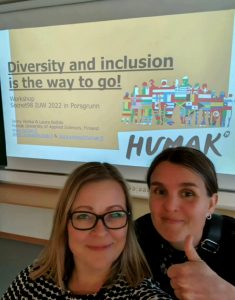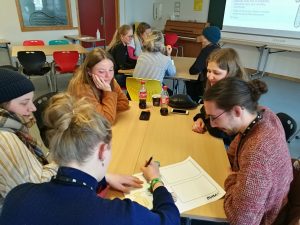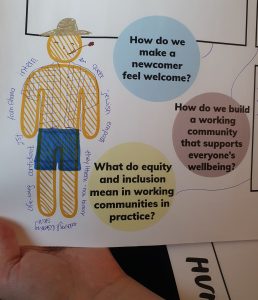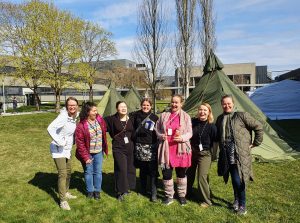Diversity and Inclusion Is the Way to Go! – SocNet98 Workshop in Norway

All over Europe, the population is ageing and we need international talents from around the world to ensure welfare and competitiveness. Hence cultural diversity in our societies is increasing. This is the reason why future social workers and community educators need intercultural competence and the ability to build diverse working communities.
We held a workshop on diversity, equity and inclusion in Porsgrunn, Norway as part of the SocNet98 International University Week in April 2022. There were participants from several European higher education institutions. We had 26 participants in our workshop. The aims of the workshop were to consider the following questions together with the students: How do we build a working community that supports everyone’s wellbeing? What do equity and inclusion mean in working communities? What are intercultural competences and how can we develop them?

Diversity, Equity and Inclusion
First, we introduced the key concepts. Diversity consists of many aspects that make each individual unique: gender, age, origin, nationality, language, religion, beliefs, opinions, political activity, trade union activity, family relationships, state of health, disabilities, sexual orientation, or other personal characteristics. Research indicates that cultural diversity increases the success, innovation, language skills and customer satisfaction of organisations (McKinsey 2020; Boston Consulting Group 2018). Yet, there is a need to tackle the labour market discrimination and racist discrimination that are still common in our societies (European Union Agency for Fundamental Rights 2018). In order to benefit from diversity, working communities must understand and appreciate diversity and be open to new ways of doing. This requires a real motivation to learn together.
In working communities, the benefits of diversity require that all the employees must be treated fairly, according to their individual needs and circumstances. In practice, equity means for example equity in recruitment, conditions of employment, equal opportunities to develop competencies and career, instructions against discrimination and harrassment cases. Therefore, in order to benefit from diversity, workplaces must actively create a culture of inclusion: all the employees feel safe, can participate, express themselves, get information and feel that they belong in the community.

Working Together
After considering these themes, we formed teams of 3-5 participants who worked actively together and thought about what these concepts mean in practice. They first got to know each other and imagined a working community they could relate to. They also visualized a newcomer that would join the working community and how to make them feel welcome.
After having an example in mind they came up with great tips for building a diverse and inclusive working community:
- Make the newcomer feel welcome and included in the working community and networks. The newcomer should feel safe: safe environment and someone to talk to.
- Talk with, not about people! Do not decide on their behalf. Pay attention to what the other says. Do not only consider your own thoughts. Consider the needs of the newcomer.
- Ensure everyone has a clear role in the working community and everyone understands their job description.
- Give practical information on the new country, working community, job tasks and organization.
- Build common rules.
- Aim at open communication and find a common language.
- Be respectful! Do not make presumptions based on the newcomer’s looks. Do not judge!
- See the opportunities instead of focusing on the problems.
- Use different kinds of methods in the onboarding: job shadowing, weekly reflection, mentor/supervisor/buddy system.
- Invest in community/team building and free time activities. Find informal moments to get to know each other. Have fun together!
- Make sure everyone has the same opportunities, no matter where they come from.
- Focus on and use the strengths and resources of every person in the working community.
- Learn from each other!
With these ideas, the students will be active agents in building working communities where everyone’s wellbeing is ensured. How wonderful to see that the future social workers and community educators have such great insights!

“Include Everyone to Build Something Stronger”
At the end of the workshop, we discussed how intercultural competencies were reflected in the tips. To reach inclusion and non-discrimination, we emphasized the importance of life-long learning in intercultural encounters. As a conclusion, we asked the students what they will take with them from the workshop. These are some of the takeaways:
“Everyone has an important part in this society.”
“Talk with and not about people!”
“We are all diverse.”
“Include everyone to build something stronger.”
“Diversity is not enough without inclusion.”
“People need to feel safe and welcome.”
What Is SocNet98?
SocNet98 – A European Network of Social Work Universities is a network consisting of 18 higher education institutions from 13 european countries. Annually, international university weeks (IUW) for university students and staff are organized by 4 different member universities around Europe. This year one of the locations was Porsgrunn where the University of Southeastern Norway (USN) is situated. The theme of IUW was activities in social work and we learned a great deal about ”friluftsliv” in Norway. Humak participated in the Norwegian week by sending two senior lecturers, Jenny Honka and Laura Keihäs, and five students, Jaana Aalto, Hanna Alanen, Emmi Heinonen, Nina Siljoranta and Laura Suominen. The lecturers organized the workshop twice and took part in the programme and networking. For the students, it was an opportunity to meet colleagues from 12 different European universities. All in all, there were 86 participants during the week.

References:
Boston Consulting Group 2018. How Diverse Leadership Teams Boost Innovation. https://www.bcg.com/en-us/publications/2018/how-diverse-leadership-teams-boost-innovation
European Union Agency for Fundamental Rights 2018. Second European Union Minorities and Discrimination Survey. Being Black in the EU. https://fra.europa.eu/sites/default/files/fra_uploads/fra-2018-being-black-in-the-eu_en.pdf
Honka, Jenny and Keihäs, Laura 2020. Preventing social exclusion in working life
= getting added value for your company. Blog post for Tempo project. Humak University of Applied Sciences. https://tempo.humak.fi/preventing-social-exclusion-in-working-life-getting-added-value-for-your-company/
McKinsey & Company 2020. Diversity wins: How inclusion matters. https://www.mckinsey.com/featured-insights/diversity-and-inclusion/diversity-wins-how-inclusion-matters
Stanford University 2022. Anti-racism toolkit. https://cardinalatwork.stanford.edu/manager-toolkit/engage/ideal-engage/anti-racism-toolkit
Text: Jenny Honka, MA (Art and Design), Senior Lecturer; Laura Keihäs, MA, Senior Lecturer
